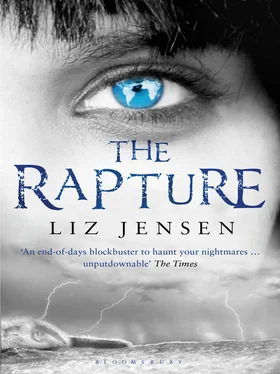I flick off the TV. Only two years ago, when I was in rehab, people like this man, with his talk of positive shrinkage, were seen as marginal eccentrics at best, and at worst, eco-fascists and eugenicists — a source of relief to those of us who found themselves at the top of their waste-of-carbon lists. But now, within a few months, what began as a movement conducted on the blogo-sphere has found its way into the mainstream. I have seen enough neglected and damaged kids to have strong opinions about people’s ‘right’ to have children. But disease is another matter.
Diseases like malaria . Diseases that foreigners get.
Inhaling minimally, and pondering the interesting evolution of the word ‘organic’, I manoeuvre myself off the sofa and into my chair. A singleton weekend looms and I must find ways to fill it.
In my new life as a queen of tragedy I have a classical lightweight wheelchair that folds into the car, which this afternoon I am using to trundle along the pedestrian area of Hadport, with its tiny boutiques selling candles and wind-chimes and horoscope jewellery and over-packaged soap, then into the shabbier side-streets of kebab outlets and newsagents, then past the cinema, the sports centre, the bird-spattered statue of Margaret Thatcher, and the elderly, pony-tailed New Ager selling fluffy worm-puppets on long strings. Today there’s an outdoor market with fresh fish and ripe fruit on display: the smell of mackerel and cheeses and sugar-toasted peanuts mingles with the salt ocean air and the tang of warmed seaweed. After the downpour and the gales, the sun is back, a relentless fireball. The heat is abrasive, a hair-dryer with no off switch. Surfaces glitter in the shimmering air. Everyone is wearing sunglasses. I can’t think of the last time I saw anyone’s eyes in daylight. Or the last time I bared mine.
I head for a café. I have discovered, whose three crucial attributes I regularly celebrate: disabled bathroom facilities, a view of the waterfront, and good coffee. Here I settle at a corner table near the window and read Bethany Krall’s medical report, the first part of which is written by Dr Ehmet, listing the various drugs she has been administered over the months, before Cotard’s syndrome and electroconvulsive therapy entered the equation. Antipsychotics and antidepressants, plus drugs to counteract the side-effects: Prozac, Cipramil, Lustral, Risperdal, Zyprexa, Trazodone, Effexor, Zoloft, Tegretol. The next part is written by Hamish Bates, a therapist who worked with Bethany for two months before leaving for the private sector. According to him the ECT ‘gave her relief from the delusion of being dead, but stimulated a preoccupation with climate change, chemical pollution, weather patterns, geological disturbances, and apocalyptic scenarios’. He is interested in Bethany’s frequent references to the Rapture, ‘a notion that is heavily debated in the Faith Wave’s Armageddon discussions, along with the belief that the Messiah will return after a seven-year period of "Tribulation" or "End Times", in which God will punish humankind for its sins, by means of plagues, floods, fire and brimstone, etc. With the spread of war in the Middle East and the fear of biological weaponry further exposing the cultural nerve, it is no surprise that a notion such as the Rapture has seen a resurgence.’ Having done his Googling and recycled some five-year-old Guardian op-eds, Hamish Bates allows himself to wax philosophical in his final paragraph, speculating that Bethany’s recurring themes are ‘classic metaphors for the turmoil of the mind, prompted by the geological disasters and meteorological vagaries of our times: clusters of catastrophes that cry out to fit into a pattern, be it accelerated global heating or divine retribution for man’s sins’.
I may question Bates’s originality, but I agree with his assessment. Bethany’s pain is planet-shaped and planet-sized: she has her own vividly imagined earthquakes and hurricanes, her own volcanic eruptions, her own changing atmosphere, her own form of meltdown.
The pool is swarming with kids at weekends, so I spend the rest of the day and Sunday at home with the fan on, surfing the net for information on electroconvulsive therapy and state-of-the-art wheelchairs which I can’t afford. My curiosity on those matters satisfied, I move on to a subject which has been at the back of my mind since the TV debate on human cull caused by the heatwave. The Planetarian movement’s spiritual leader — though he publicly distances himself from its wilder outpourings — is the Calcutta-born, Paris-based Harish Modak, a geologist and one-time colleague of the late James Lovelock, who came up with the notion of Gaia, the planet as a self-regulating organism with its own ‘geophysiology’. I skim Modak’s latest article, which appeared recently in the Washington Post . There is ‘colossal arrogance’, he maintains, in the assumption that humans will last for ever. If we look at the planet’s life across billions of years, rather than in terms of humankind’s meagre history as a dominant species, we will see that our presence on Earth has lasted the blink of an eye. ‘We are the agents of our own destruction — and when we are gone, extinguished by our own heedless quest for expansion, the planet will not mourn us. Indeed, it will have cause to rejoice. Today, the human species stands at the brink of a new mass extinction which will see if not its disappearance, then its extreme marginalisation.’ Modak cites climate model projections which back this up starkly, and reproduces the famous table which demonstrates how, if the planet is allowed to heat up by three further degrees, positive feedbacks will force it up to four, then five, then six. ‘The Chinese curse "may you live in interesting times" has descended on those of us living in the twenty-first century as never before,’ Modak concludes. I rather like his grandiloquence. He’d probably object to anyone saying it, but his sentiments have a biblical as well as a Hindu ring to them. ‘For the first time in human history, the destruction — already apparent — is global. In times past, children and grandchildren were seen as a blessing, a sign of faith in the future of the gene-pool. Now, it would seem that the kindest thing to do for our grandchildren is to refrain from generating them.’
Although more conservative and measured than the Planetarian on the TV, Modak’s underlying message seems to be that pessimism is the new realism. I do not doubt his projections or his figures or his graphs. But his conclusions depress me.
Once a year Hadport is home to the national British chess championships. Chess players are notorious for both their terrible dress sense and their lack of orientation skills. It was a week ago that I first caught sight of the carrot-haired woman — in her forties, badly dressed, dishevelled — opposite my flat. At first I assumed she was one of their strange tribe, stranded in Hadport after her lost chess match like a misplaced evacuee. She looked off kilter. But then I had other thoughts, prompted by the fact that she was empty-handed. Every woman — whether or not she plays chess — carries a bag. Her lack of this standard accessory made me think that perhaps she was local after all: local enough to be a neighbour who has popped out on a rare bag-free errand. Or mad. A bagless woman can look, and feel, almost obscenely naked. Dewombed. In a world increasingly full of distressed people, every small town has its aimless oddballs, men and women who drift in and out like flotsam.
When I arrive home from the café. later that afternoon, I see the woman again. She’s standing on the pavement opposite my flat, her hands hanging loosely at her sides. She’s wearing a T-shirt and linen trousers. I feel her watching me but I refrain from looking directly back at her. During the whole of my transfer out of the car, she doesn’t shift. Once in the house, I glance at her through the window. She is still standing there, motionless, like a mannequin on guard duty.
Читать дальше












